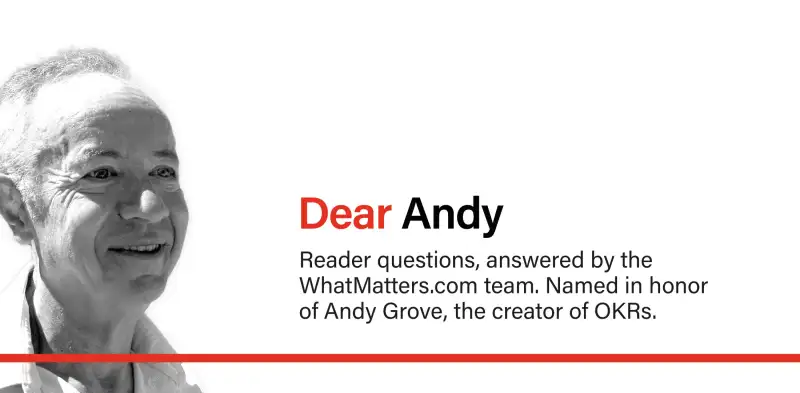Dear Andy,
What does one do with OKRs that don’t make the cut for that quarter? Put ’em in backlog? Delete ’em? Toss ’em out? Put ’em in a scrapbook? Hold them in digital space? Or does the ideation review process for the next set of OKRs just start fresh, to avoid looking back at what you had before, as to prevent a monolith of OKRs from building up?
Is the thinking that if it’s that important or urgent, it probably should have been in the previous quarter? Or it will resurface for next quarter?
Thank you for any thoughts and insights you may have on this topic.
Todd

Hi Todd!
Thanks for writing in and for your great question.
OKRs, first and foremost, should highlight your company’s highest priorities at the moment. Unfortunately, no team can do it all, so there will, of course, be OKRs from your planning sessions that never see the light of day. That’s very common, and it’s okay! An OKR that didn’t make the cut the first time might be a top priority later.
During the ideation session, team members come to the table with different priorities. Let’s say one team member wants to devote your resources to recruiting top-level employees, while another team member wants to focus on beating a competitor in the market. After much discussion, you decide that before trying to beat the competitor, your team needs to be properly staffed and ready to go. Collectively, you choose to make recruitment the focus of this quarter’s OKRs. The competition-focused OKR is still a worthy goal and shouldn’t be discarded. ‘Park’ it for a cycle and revisit it when the dream-team is in place. In fact, the competition OKR will serve as an excellent indicator that your recruitment endeavors were a success.
As far as where to ‘park’ OKRs, a digital log (or highly decorative scrapbook) of “gone but not forgotten OKRs” can be very useful. Avoid thinking of them as a backlog of more things to accomplish, use them as jumping-off points — or for when the ol’ inspiration well is running low. You don’t even need to take the entire OKR, you may just grab a KR or two — or just a certain word or phrase.
That being said, don’t feel guilty about moving on from past OKRs ideas. OKRs reflect your current priorities — if a discarded OKR now fits that description, then great! If it doesn’t, scrap it and move on.
Well Todd, I hope this has been helpful for you. Thank you for writing in and best of luck to you and your team on your OKR journey.
Sincerely,
Billy from the What Matters Team
P.S. If you do go the scrapbook route, I insist you send pictures :)

